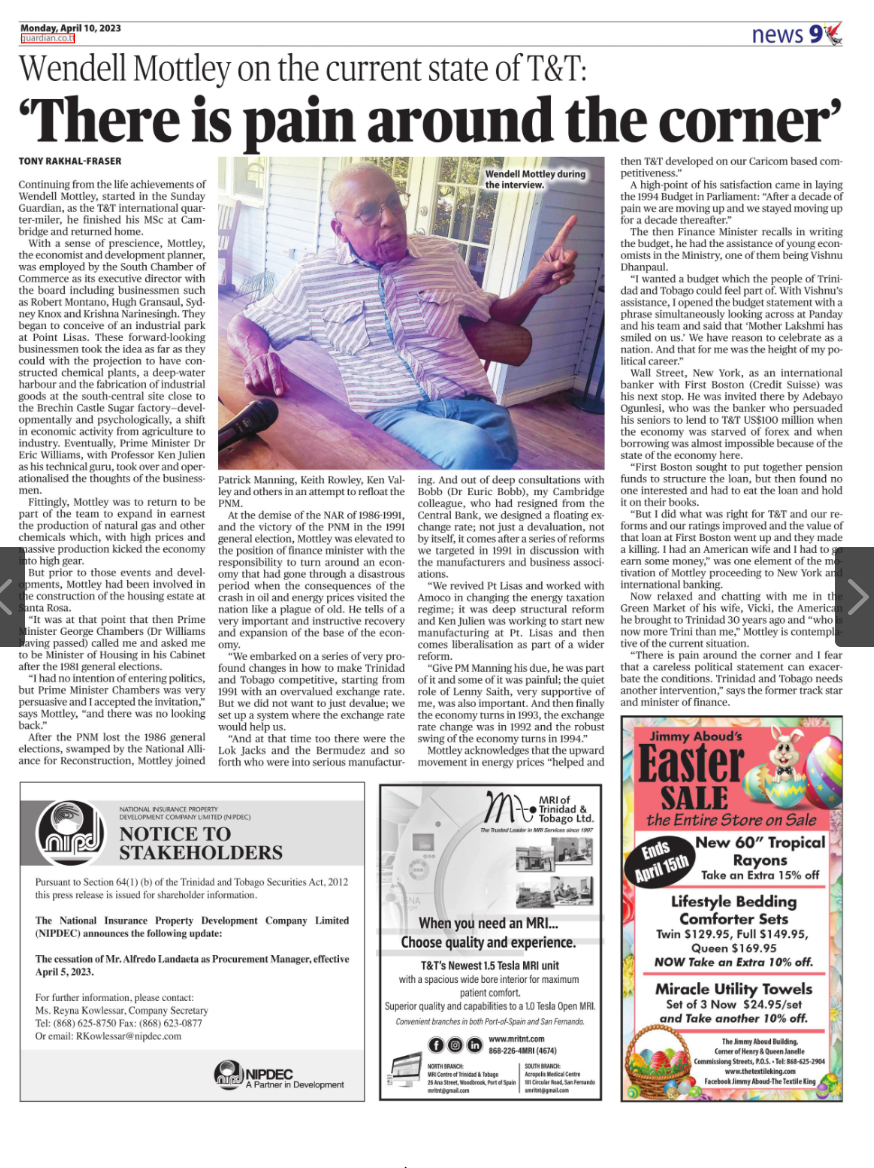‘There is pain around the corner’
By Tony Rakhal-Fraser
Wendell Mottley on the current state
of T&T:
Continuing from the life achievements of Wendell
Mottley, started in the Sunday Guardian, as the T&T
international quarter-miler, he finished his MSc at
Cambridge and returned home.
With a sense of prescience, Mottley, the economist and
development planner, was employed by the South
Chamber of Commerce as its executive director with the
board including businessmen such as Robert Montano,
Hugh Gransaul, Sydney Knox and Krishna Narinesingh.
They began to conceive of an industrial park at Point
Lisas. These forward-looking businessmen took the idea
as far as they could with the projection to have
constructed chemical plants, a deep-water harbour and
the fabrication of industrial goods at the south-central
site close to the Brechin Castle Sugar factory—
developmentally and psychologically, a shift in economic
activity from agriculture to industry. Eventually, Prime
Minister Dr Eric Williams, with Professor Ken Julien as his
technical guru, took over and operationalised the
thoughts of the businessmen.
Fittingly, Mottley was to return to be part of the team to
expand in earnest the production of natural gas and other
chemicals which, with high prices and massive
production kicked the economy into high gear.
But prior to those events and developments, Mottley had
been involved in the construction of the housing estate at
Santa Rosa.
“It was at that point that then Prime Minister George
Chambers (Dr Williams having passed) called me and
asked me to be Minister of Housing in his Cabinet after
the 1981 general elections.
“I had no intention of entering politics, but Prime
Minister Chambers was very persuasive and I accepted
the invitation,” says Mottley, “and there was no looking
back.”
After the PNM lost the 1986 general elections, swamped
by the National Alliance for Reconstruction, Mottley
joined Patrick Manning, Keith Rowley, Ken Valley and
others in an attempt to refloat the PNM.
At the demise of the NAR of 1986-1991, and the victory of
the PNM in the 1991 general election, Mottley was
elevated to the position of finance minister with the
responsibility to turn around an economy that had gone
through a disastrous period when the consequences of
the crash in oil and energy prices visited the nation like a
plague of old. He tells of a very important and instructive
recovery and expansion of the base of the economy.
“We embarked on a series of very profound changes in
how to make Trinidad and Tobago competitive, starting
from 1991 with an overvalued exchange rate.
But we did not want to just devalue; we set up a system
where the exchange rate would help us. “And at that time
too there were the Lok Jacks and the Bermudez and so
forth who were into serious manufacturing.
And out of deep consultations with Bobb (Dr Euric Bobb),
my Cambridge colleague, who had resigned from the
Central Bank, we designed a floating exchange rate; not
just a devaluation, not by itself, it comes after a series of
reforms we targeted in 1991 in discussion with the
manufacturers and business associations.
“We revived Pt Lisas and worked with Amoco in changing
the energy taxation regime; it was deep structural reform
and Ken Julien was working to start new manufacturing at
Pt. Lisas and then comes liberalisation as part of a wider
reform.
“Give PM Manning his due, he was part of it and some of
it was painful; the quiet role of Lenny Saith, very
supportive of me, was also important. And then finally
the economy turns in 1993, the exchange rate change was
in 1992 and the robust swing of the economy turns in
1994.”
Mottley acknowledges that the upward movement in
energy prices “helped and then T&T developed on our
Caricom based competitiveness.”
A high-point of his satisfaction came in laying the 1994
Budget in Parliament: “After a decade of pain we are
moving up and we stayed moving up for a decade
thereafter.”
The then Finance Minister recalls in writing the budget,
he had the assistance of young economists in the
Ministry, one of them being Vishnu Dhanpaul.
“I wanted a budget which the people of Trinidad and
Tobago could feel part of. With Vishnu’s assistance, I
opened the budget statement with a phrase
simultaneously looking across at Panday and his team
and said that ‘Mother Lakshmi has smiled on us.’ We
have reason to celebrate as a nation. And that for me was
the height of my political career.”
Wall Street, New York, as an international banker with
First Boston (Credit Suisse) was his next stop. He was
invited there by Adebayo Ogunlesi, who was the banker
who persuaded his seniors to lend to T&T US$100 million
when the economy was starved of forex and when
borrowing was almost impossible because of the state of
the economy here.
“First Boston sought to put together pension funds to
structure the loan, but then found no one interested and
had to eat the loan and hold it on their books.
“But I did what was right for T&T and our reforms and our
ratings improved and the value of that loan at First
Boston went up and they made a killing. I had an
American wife and I had to go earn some money,” was
one element of the motivation of Mottley proceeding to
New York and international banking.
Now relaxed and chatting with me in the Green Market of
his wife, Vicki, the American he brought to Trinidad 30
years ago and “who is now more Trini than me,” Mottley
is contemplative of the current situation.
“There is pain around the corner and I fear that a careless
political statement can exacerbate the conditions.
Trinidad and Tobago needs another intervention,” says
the former track star and minister of finance.
Photo -Wendell Mottley during the interview.

